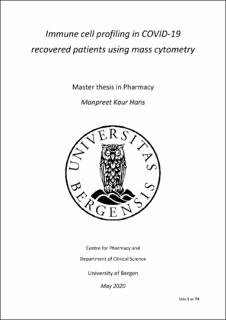Immune cell profiling in COVID-19 recovered patients using mass cytometry
Master thesis
Permanent lenke
https://hdl.handle.net/11250/2761431Utgivelsesdato
2021-05-20Metadata
Vis full innførselSamlinger
- Master theses [30]
Sammendrag
Coronavirus disease 2019 (COVID-19), caused by the zoologic virus severe acute respiratory syndrome coronavirus 2 (SARS-CoV-2), is among the most impactful pandemics in modern history. Infection impact has variating tendency within patients that experience mild disease compared to severely affected patients, such as respiratory failure and death. Currently, treatment strategies aim to alleviating the symptoms, but a healing cure except vaccination is not resolved yet, due to lack of knowledge about the virus and how it affects the immune system. Duration of immunological memory after experiencing COVID-19 is unclear and unknown, along with limited knowledge about the disease grade influence on the immune system recovery. Firstly, this thesis aimed to study the peripheral blood immune system in SARS-Cov-2 infected patients 6 months post-infection. Using a mass cytometric approach, fixed whole blood in SARS-Cov-2 infected patients and healthy controls were analyzed. We compared immune cell frequencies among moderate and severe disease patients compared to healthy controls. A SARS-CoV-2 specific heterogeneity was observed which indicated recovery based on other factors, such as genetics and medical history. Secondly, we aimed to identify cell-affecting concentrations of randomly selected phytochemicals (Ellagic acid, rumic acid, Dinatin 7-glucuoronide, and plantainoside D) that can potentially be used in COVID-19 treatment. MTT (3-(4, 5-dimethylthiazolyl-2)-2, 5-diphenyltetrazolium bromide) assay was exploited to find concentrations that affected the cell proliferation on human embryonic kidney cells (HEK293), human embryonic kidney cells variant that express a temperature- sensitive allele of SV40 T antigen (HEK-293t) and colorectal adenocarcinoma cells 2 (CACO-2).
